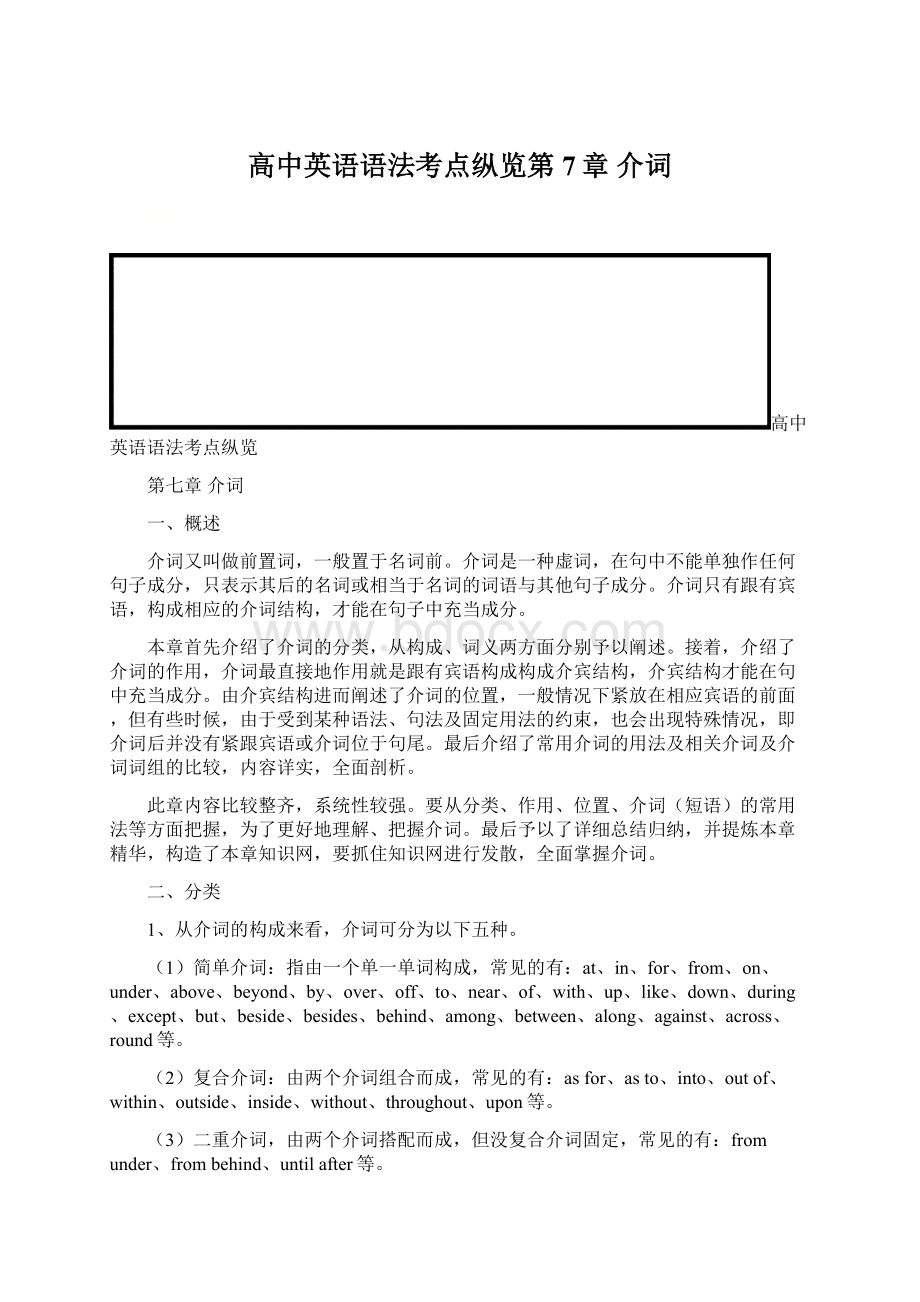高中英语语法考点纵览第7章 介词.docx
《高中英语语法考点纵览第7章 介词.docx》由会员分享,可在线阅读,更多相关《高中英语语法考点纵览第7章 介词.docx(36页珍藏版)》请在冰豆网上搜索。

高中英语语法考点纵览第7章介词
高中英语语法考点纵览
第七章介词
一、概述
介词又叫做前置词,一般置于名词前。
介词是一种虚词,在句中不能单独作任何句子成分,只表示其后的名词或相当于名词的词语与其他句子成分。
介词只有跟有宾语,构成相应的介词结构,才能在句子中充当成分。
本章首先介绍了介词的分类,从构成、词义两方面分别予以阐述。
接着,介绍了介词的作用,介词最直接地作用就是跟有宾语构成构成介宾结构,介宾结构才能在句中充当成分。
由介宾结构进而阐述了介词的位置,一般情况下紧放在相应宾语的前面,但有些时候,由于受到某种语法、句法及固定用法的约束,也会出现特殊情况,即介词后并没有紧跟宾语或介词位于句尾。
最后介绍了常用介词的用法及相关介词及介词词组的比较,内容详实,全面剖析。
此章内容比较整齐,系统性较强。
要从分类、作用、位置、介词(短语)的常用法等方面把握,为了更好地理解、把握介词。
最后予以了详细总结归纳,并提炼本章精华,构造了本章知识网,要抓住知识网进行发散,全面掌握介词。
二、分类
1、从介词的构成来看,介词可分为以下五种。
(1)简单介词:
指由一个单一单词构成,常见的有:
at、in、for、from、on、under、above、beyond、by、over、off、to、near、of、with、up、like、down、during、except、but、beside、besides、behind、among、between、along、against、across、round等。
(2)复合介词:
由两个介词组合而成,常见的有:
asfor、asto、into、outof、within、outside、inside、without、throughout、upon等。
(3)二重介词,由两个介词搭配而成,但没复合介词固定,常见的有:
fromunder、frombehind、untilafter等。
(4)现在分词介词:
由现在分词构成,常见的有:
concerning、regarding、including、respecting、saving等。
(5)短语介词:
由短语构成,常见的有:
becauseof、accordingto、inspiteof、onbehalfof、withreferenceto、outof、butfor、aheadof、apartfrom、dueto、asconcerns、forwantof、withaviewto、forthesakeof、intheeventof等。
2、从介词的词义来看,常表示以下几种含义。
如:
(1)表时间,如:
at、about、before、after、for、since、until、during、over、on、till、to、within、as、around、by等。
(2)表地点,如:
at、in、on、under、above、over、behind、off、near、around、below、beneath、beyond、across、along、among、into、towards、throughout等。
(3)表示除了,如:
except、exceptfor、besides、beyond、but、apartfrom等。
(4)表示所属关系,如:
of、with等。
(5)表示手段、方式,如:
by、with、in等。
(6)表示条件,如:
on、without、considering等。
(7)表示原因,如:
for、at、with、about、becauseof、dueto等。
(8)表示比较,如:
as、like等。
(9)表示关于,如:
asto、asfor、concerning、inrespectof、about、on、regarding、withregardto等。
(10)表示反对或赞成,如:
for、against等。
(11)表示让步,如:
inspiteof、despite、notwithstanding等。
三、作用
介词必须同其他词类或成分连用才能在句中充当语法成分。
介词和介词宾语一起构成介词短语,介词短语在句中可充当下列以下成分。
如:
1、主语
Fromourdormitorytotheteachingbuildingisfive-minuteriding.
Betweentwoandthreepeoplewilldothejob.
2、表语
Somepeopleareagainstthedecision.
Thebookisonthedesk.
3、宾语
Thecriminalwillserveasentenceofbetween2and7years.
Theboyshowsupfrombehindthedoor.
4、定语
Thegirlwithalonghairissobeautiful.
Afriendinneedisafriendindeed.
5、状语
Hearrivedhomeataboutteno’clockatnight.
Consideringthetimeofthemeeting,weshouldgetupearly.
6、补语
Ifoundtheoldmaninbadconditionofhealth.
Hewaselectedaspresidentofthecountry.
上面我们提到,介词后必须跟有宾语才能构成介词短语,在句中充当一定的成分,下面讲述关于介词的宾语问题。
介词的宾语不仅限于名词和代词,还可以是其他词类或句子等。
(1)名词
Hecameintotheroomandsatonthechair.
Theprofessorwillmakealectureabouteducation.
(2)代词
Withthat,heleftoff.
Healwayscarriesthecellphonewithhim.
(3)形容词
Incommonwithothers,healsolikesChairmanMao.
Atmost,therearefourpeopleintheroom.
(4)副词
Hecouldseethemountainclearlyfromhere.
Hehadtoldmethisuntilrecently.
(5)动名词
Themanhadsomedifficultyindoingthejob.
Becauseofbeinglateforschool,theboywascriticizedbyhisteacher.
(6)不定式
Hecouldn’tdoanythingbutwait.
Thegirlknewbettertolovetheman.
(7)介词短语
Heworkeduntilintothenight.
Hecamefromoppositetheshop.
(8)数词
Oneintenstudentshasthechancetotakepartintheexam.
Afterschool,thestudentsleaveintwosandthrees.
(9)疑问词+不定式
Hegavemesomeadviceonhowtodothejob.
Hecalledtoremindmeofwheretomeet.
(10)疑问词引导的从句
Icareaboutwhowillwinthegame.
Ihadnoideaastowhetherhewillfollowme.
(11)that引导从句
HelikedEnglishinthathehadgreatinterestinit.
IwouldattendthemeetingbutthatIamseriouslyill.
对上述内容予以补充说明以下几点:
1、介词后一般用动名词做宾语,用不定式作宾语只局限在一些固定句型中,如:
can’tchoosebutdosth、can’thelpbutdosth、haveno(other)choicebuttodosth、donothingbutdosth、wouldrather(sooner)…thandosth、coulddonootherwisethan(to)dosth、knowbetterthantodo等结构中。
应注意,当介词后的不定式用以解释句中实义动词do时,不定式符号to可省略,即用动词原形作介词宾语,如上述结构中的donothingbutdo、can’tdoanythingexceptdo等。
2、应注意的是除了inthat、exceptthat、savethat、butthat、notwithstandingthat外,that引导的从句不可直接作介词的宾语,必须借用形式宾语it,然后再加相应that从句。
如:
Youcan’tdependonitthathegivesyouanyhelp.
3、形容词作介词宾语情况是不多的,常用于固定词组中。
如:
incommon、inshort、atmost、atleast、forthebetter、infull、inearnest、forsure、frombadtoworse、atlarge、ofold、inthewrong、oflate、tothefull、onthewhole等。
四、位置
1、介词通常位于名词或代词前。
如:
Therearemanybirdsinthetree.
Didyoubelieveinhim?
2、在某些特殊句法结构中,介词也可放在句尾。
如:
(1)以which、what、whose、who引导的疑问句,介词常放在句尾。
如:
Whichareyoupointingat?
Whatroomdoyoulivein?
Whoareyoutalkingto?
(2)定语从句中位于which、whom之前的介词可以放在句尾。
如:
Heisthemanthat/whoheturnstoforhelp.
Themanishisteammatethat/whoheoftenwalkswith.
(3)某些以-wh词引导的名词性从句中,关系代词位于从句句首时,介词应后置。
如:
Idon’tknowwhattheboylookslike.
Courageiswhatheisinneedofwhenhefails.
(4)动词不定式作状语,需要介词同句中主语构成介宾关系时,介词后置。
如:
Theroomiscomfortabletolivein.
Thewaterishottobathein.
(5)动词不定式作后置定语,不及物动词后的介词同所修饰的名词构成介宾关系,介词后置。
如:
Thatisagoodplacetogo